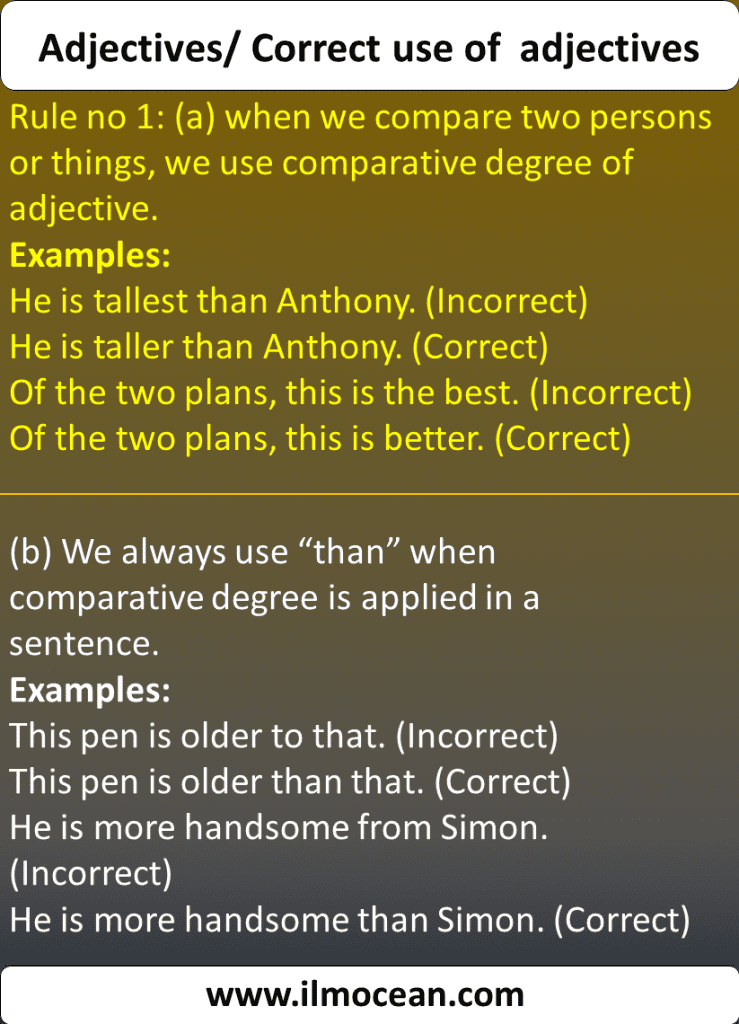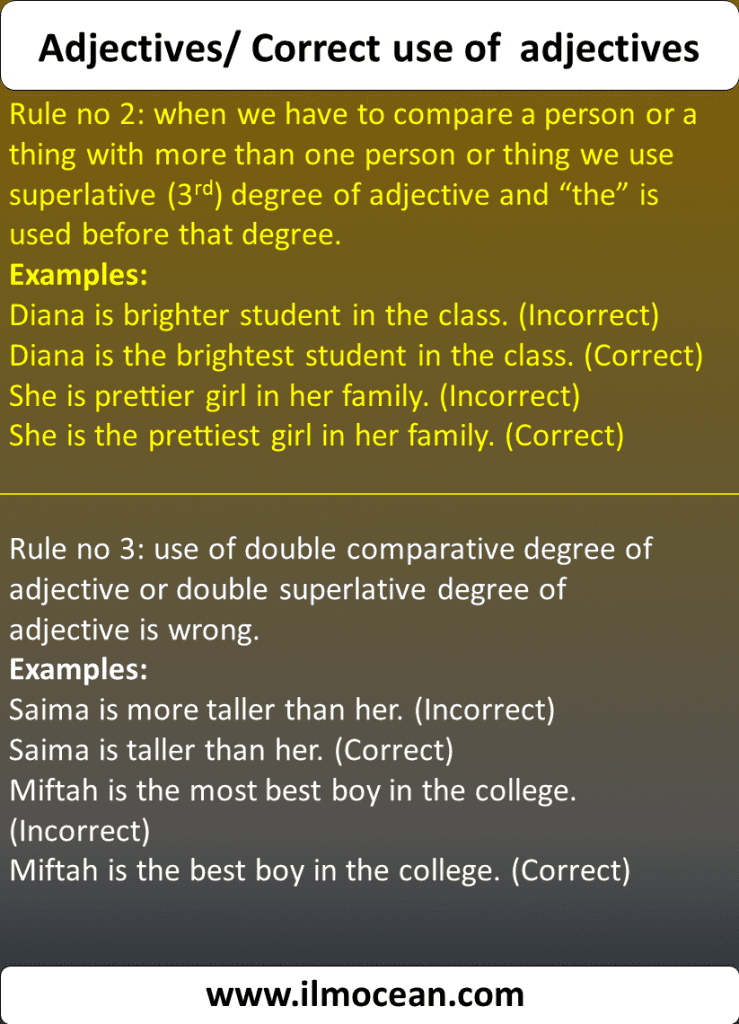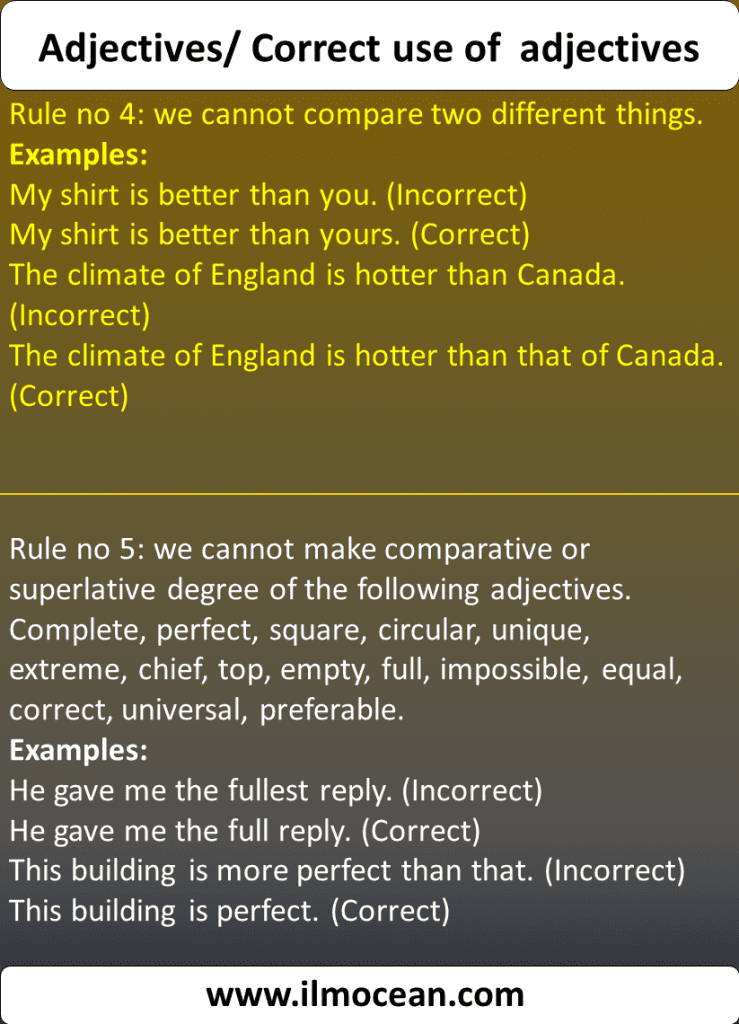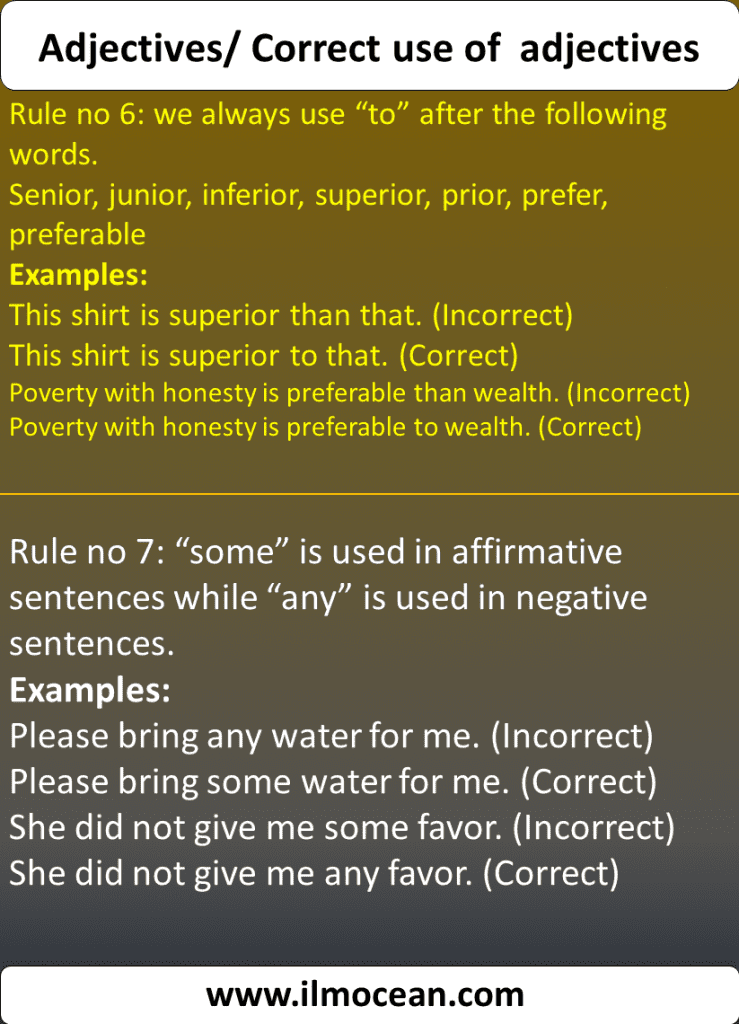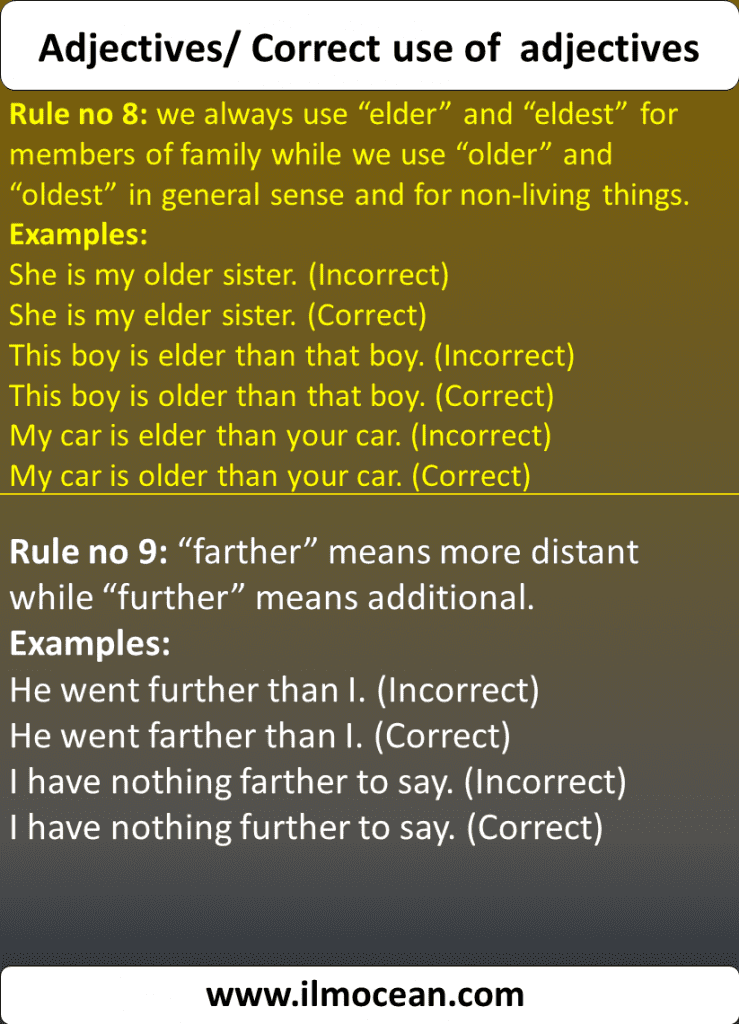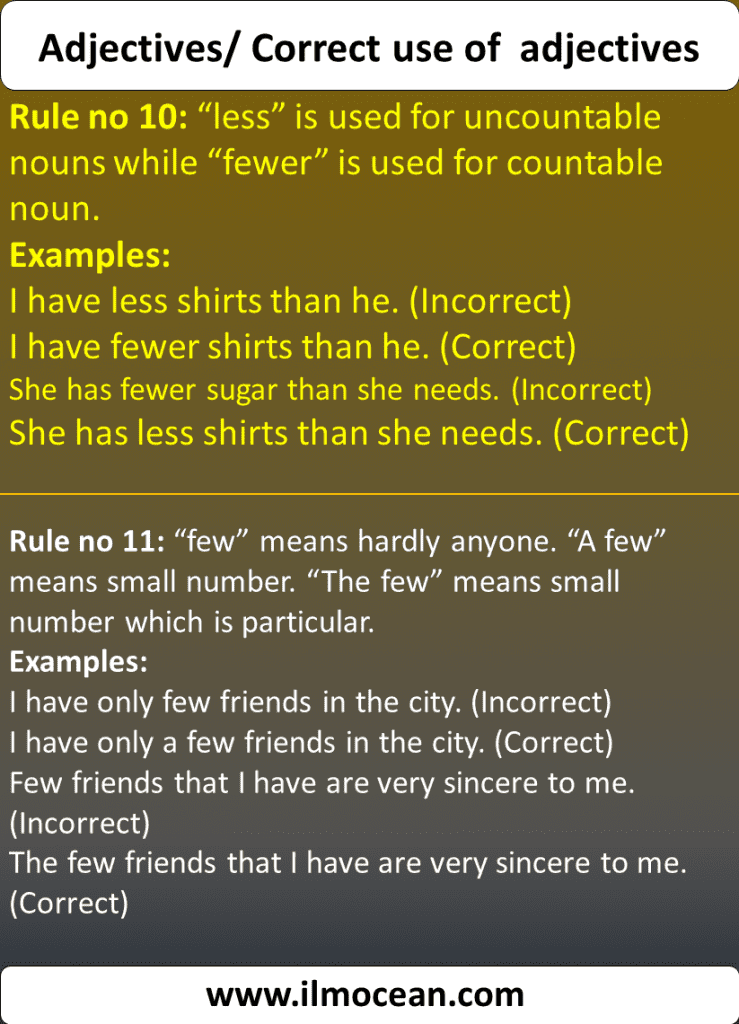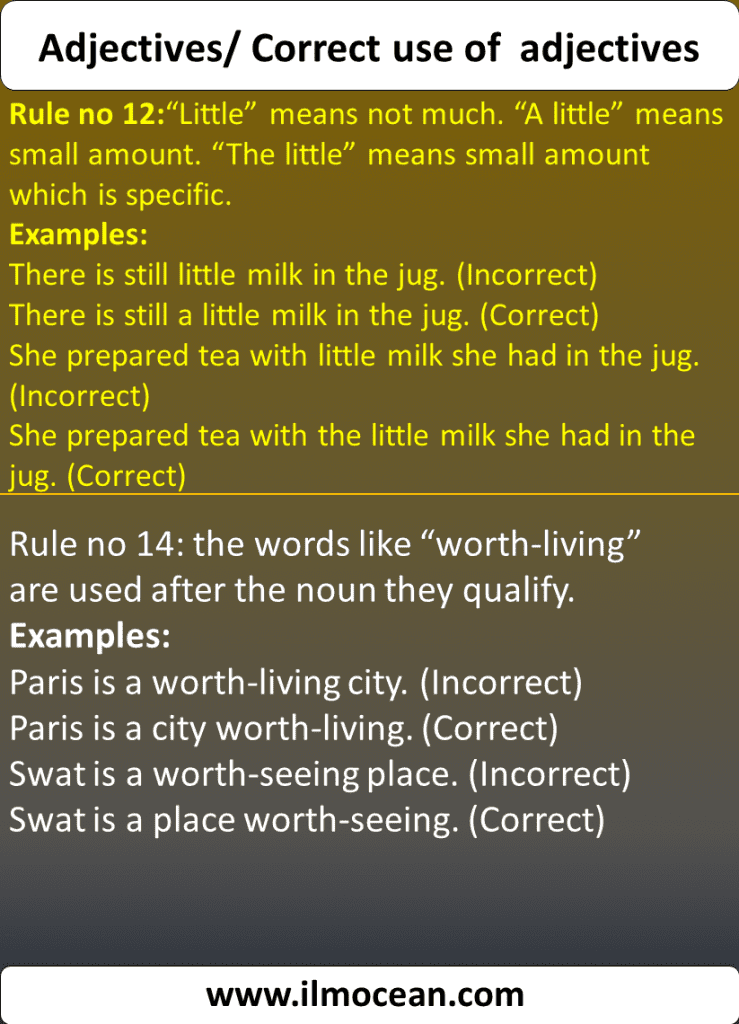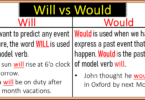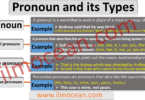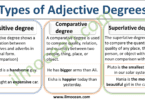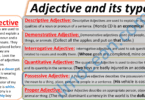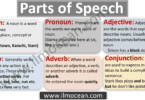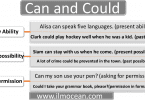Use of Adjective/Correction of Errors in Adjective
Adjective shows the characteristics of noun.it describes a noun. It explains and modify noun. So it is clear that adjective needs noun. Without noun there is no need of adjective in sentence. Adjective gives information about noun or pronoun. adjective always associated with noun. every thing present in this universe is called noun and any word which explains the type or kind of noun is called adjective. so it is clear that adjective needs noun. It is a common misunderstanding that adjectice always comes after noun. Adjective can come any where in the sentence before or after the noun or pronoun. It has two main types.
- Descriptive adjective:
These are more interesting adjectives because these are the common adjectives we think about them. We are familiar with these adjectives. These adjectives easily describes and explains noun and pronoun.
Examples:
Beautiful, big, small, tall, short, orange
This shirt is blue.
- Determiners adjectives:
These are small group of grammar acting as adjectives. These are also called less interesting adjectives.
Examples:
My, our, his, her, which, this, that, these, those, your etc.
That is my car.
Rules for correction of errors in adjectives.
Rule no 1: (a) when we compare two persons or things, we use comparative degree of adjective.
Examples:
He is tallest than Anthony. (Incorrect)
He is taller than Anthony. (Correct)
Of the two plans, this is the best. (Incorrect)
Of the two plans, this is better. (Correct)
(b) We always use “than” when comparative degree is applied in a sentence.
Examples:
This pen is older to that. (Incorrect)
This pen is older than that. (Correct)
He is more handsome from Simon. (Incorrect)
He is more handsome than Simon. (Correct)
Rule no 2: when we have to compare a person or a thing with more than one person or thing we use superlative (3rd) degree of adjective and “the” is used before that degree.
Examples:
Diana is brighter student in the class. (Incorrect)
Diana is the brightest student in the class. (Correct)
She is prettier girl in her family. (Incorrect)
She is the prettiest girl in her family. (Correct)
Rule no 3: use of double comparative degree of adjective or double superlative degree of adjective is wrong.
Examples:
Saima is more taller than her. (Incorrect)
Saima is taller than her. (Correct)
Miftah is the most best boy in the college. (Incorrect)
Miftah is the best boy in the college. (Correct)
Rule no 4: we cannot compare two different things.
Examples:
My shirt is better than you. (Incorrect)
My shirt is better than yours. (Correct)
The climate of England is hotter than Canada. (Incorrect)
The climate of England is hotter than that of Canada. (Correct)
Rule no 5: we cannot make comparative or superlative degree of the following adjectives.
Complete, perfect, square, circular, unique, extreme, chief, top, empty, full, impossible, equal, correct, universal, preferable.
Examples:
He gave me the fullest reply. (Incorrect)
He gave me the full reply. (Correct)
This building is more perfect than that. (Incorrect)
This building is perfect. (Correct)
Rule no 6: we always use “to” after the following words.
Senior, junior, inferior, superior, prior, prefer, preferable
Examples:
This shirt is superior than that. (Incorrect)
This shirt is superior to that. (Correct)
Poverty with honesty is preferable than wealth. (Incorrect)
Poverty with honesty is preferable to wealth. (Correct)
Rule no 7: “some” is used in affirmative sentences while “any” is used in negative sentences.
Examples:
Please bring any water for me. (Incorrect)
Please bring some water for me. (Correct)
She did not give me some favor. (Incorrect)
She did not give me any favor. (Correct)
Rule no 8: we always use “elder” and “eldest” for members of family while we use “older” and “oldest” in general sense and for non-living things.
Examples:
She is my older sister. (Incorrect)
She is my elder sister. (Correct)
This boy is elder than that boy. (Incorrect)
This boy is older than that boy. (Correct)
My car is elder than your car. (Incorrect)
My car is older than your car. (Correct)
Rule no 9: “farther” means more distant while “further” means additional.
Examples:
He went further than I. (Incorrect)
He went farther than I. (Correct)
I have nothing farther to say. (Incorrect)
I have nothing further to say. (Correct)
Rule no 10: “less” is used for uncountable nouns while “fewer” is used for countable noun.
Examples:
I have less shirts than he. (Incorrect)
I have fewer shirts than he. (Correct)
She has fewer sugar than she needs. (Incorrect)
She has less shirts than she needs. (Correct)
Rule no 11: “last” means something which is at the end while “latest” means something which is quite fresh.
Examples:
My name was the latest in the list. (Incorrect)
My name was the last in the list. (Correct)
What is the last news about the match? (Incorrect)
What is the latest news about the match? (Correct)
Rule no 12: “few” means hardly anyone. “A few” means small number. “The few” means small number which is particular.
Examples:
I have only few friends in the city. (Incorrect)
I have only a few friends in the city. (Correct)
Few friends that I have are very sincere to me. (Incorrect)
The few friends that I have are very sincere to me. (Correct)
Rule no 13:“Little” means not much. “A little” means small amount. “The little” means small amount which is specific.
Examples:
There is still little milk in the jug. (Incorrect)
There is still a little milk in the jug. (Correct)
She prepared tea with little milk she had in the jug. (Incorrect)
She prepared tea with the little milk she had in the jug. (Correct)
Rule no 14: the words like “worth-living” are used after the noun they qualify.
Examples:
Paris is a worth-living city. (Incorrect)
Paris is a city worth-living. (Correct)
Swat is a worth-seeing place. (Incorrect)
Swat is a place worth-seeing. (Correct)
Some common examples of use of adjective.
| He is more stronger than his brother. (Incorrect) |
| He is stronger than his brother. (Correct) |
| Hania was the oldest daughter of fareed. (Incorrect) |
| Hania was the eldest daughter of fareed. (Correct) |
| As a novelist, Hardy is superior than Ibsen. (Incorrect) |
| As a novelist, Hardy is superior to Ibsen. (Correct) |
| Little money is better than no money. (Incorrect) |
| A little money is better than no money. (Correct) |
| Which is the best of the two? (Incorrect) |
| Which is the better of the two? (Correct) |
| I shall stay at Canada for few days. (Incorrect) |
| I shall stay at Canada for a few days. (Correct) |
| She showed fewer honesty than her sister. (Incorrect) |
| She showed less honesty than her sister. (Correct) |
| He is the most kindest of our teachers. (Incorrect) |
| He is the kindest of our teachers. (Correct) |
| He is a worst student. (Incorrect) |
| He is the worst student. (Correct) |
| Are you the eldest person in the village? (Incorrect) |
| Are you the oldest person in the village? (Correct) |


